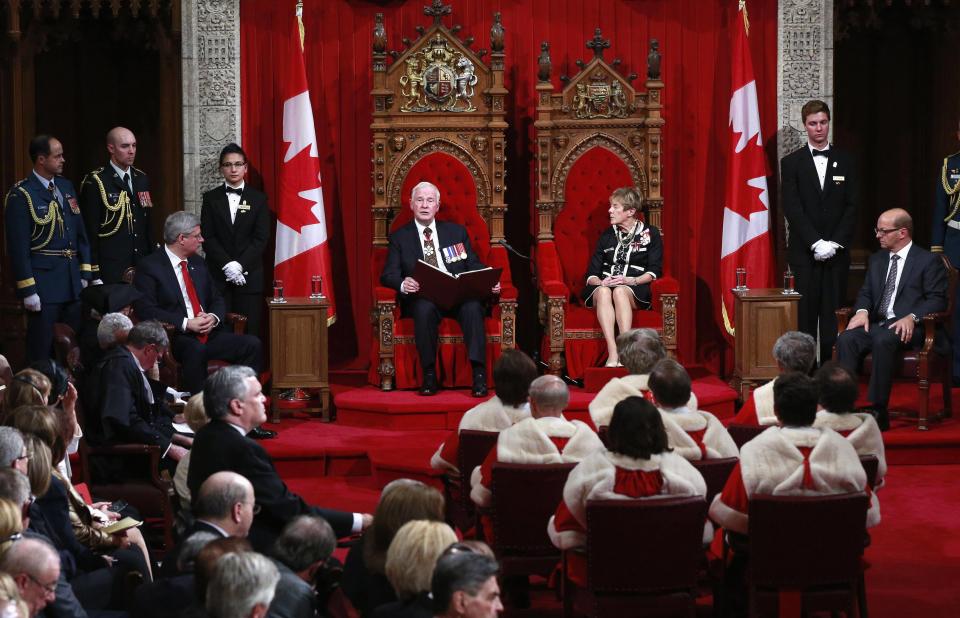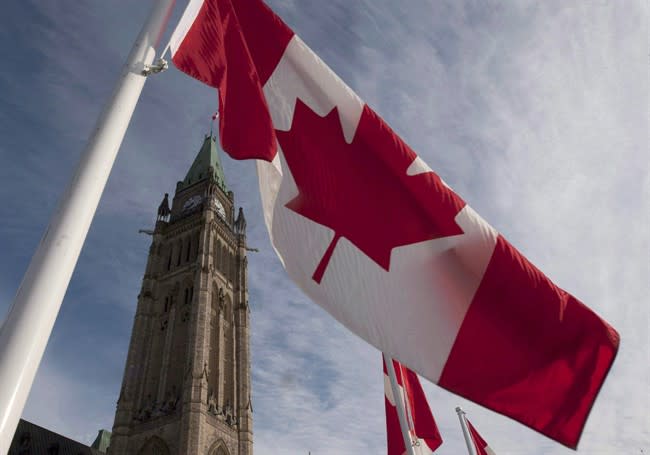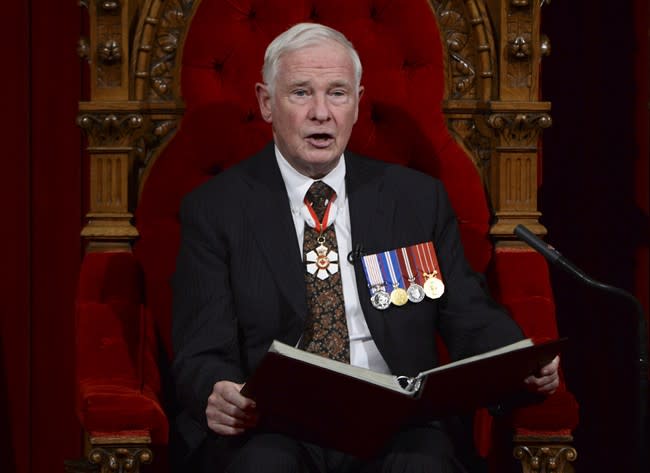Balanced-budget law, imminent Canada-EU trade deal mark throne speech
OTTAWA - Mandatory balanced-budget legislation, interprovincial booze runs, public sector bashing and lifetime prison terms are among a grab bag of populist Conservative promises in a mid-mandate policy makeover.
The Tory-blue booty was included in a lengthy speech from the throne Wednesday by Gov. Gen. David Johnston that spent almost as much time congratulating the Harper government on past achievements as laying out future priorities.
As such, the document marked both the belated return of Parliament and the unofficial start to a federal election campaign that is still two years away.
"Tell the prime minister you've got his back — and help us seize Canada's moment," the Conservative party operations director, Fred Delorey, urged party followers in a mass email shortly after the late-afternoon speech concluded in the Senate chamber.
Watching Stephen Harper's back appears to be a catchphrase as beleaguered Conservatives return to the parliamentary fray.
Harper is beset by ongoing Senate expense scandals and polls that consistently show his party tied or trailing the rejuvenated Liberals, and near neck-and-neck with the official Opposition New Democrats.
The throne speech made several unalloyed pitches for consumer affections, with promises to "unbundle" cable TV packages, reduce smart phone roaming charges, permit the transport of beer and spirits between provinces and even stop companies from charging for providing paper bills.
It's the Conservative response to a broad appeal for those ill-defined "middle class" voters both Liberals and New Democrats covet.
"To change the channel it's going to take more than a few watered down NDP proposals to do it," sniffed Tom Mulcair, the leader of the New Democrats.
Liberal Leader Justin Trudeau, for his part, dismissed the "veneer of little solutions" listed in the speech.
"We have real problems in this country and this government is more preoccupied with its own problems than the problems of Canadians."
Probably the day's greatest drama came when police evacuated the historic Langevin Block, home to Harper's working office, due to a suspicious package and bomb threat.
Police took a person into custody and later said the package had been "rendered safe using a robot" before the building across the street from Parliament Hill was reopened.
Within the Senate chamber crowded with invited guests — but absent high-profile ex-Conservative miscreants Mike Duffy, Pamela Wallin and Patrick Brazeau — the speech was delivered to near silence.
There was the announcement of an imminent free trade deal with the European Union, and a pledge to confer honorary Canadian citizenship on Malala Yousafzai, the Pakistani teen and Nobel Peace Prize nominee who survived a Taliban attack on her school bus in October 2012.
There was also the promise of a new cyberbullying law, and even a hint at the prospect of abolishing the Senate.
"The Senate must be reformed or, as with its provincial counterparts, vanish," said the speech, delivered in the very chamber that Harper has packed with appointed loyalists — several of whom have caused his government no end of grief.
The line prompted a rare murmur from the assembled senators and government guests.
But the speech was more noteworthy for how it hammered away at what political strategists like to call "wedge" issues that will differentiate the Conservatives from their opponents at the ballot box.
While a pending free trade deal with the European Union is a truly significant national event, it merited only a single line in the speech.
By contrast, measures that come down hard on public sector workers — a primarily Conservative preoccupation — took up almost an entire page.
Parents will be given a say "before drug injection sites open in their communities," the government promised, while also saying it will close loopholes that "allow for the feeding of addiction under the guise of treatment."
Both measures are a direct contrast to Trudeau's Liberal musings about legalizing marijuana.
There are also more tough-on-convicts measures, including language to ensure "a life sentence means a sentence for life," and a promise to ensure immigrants to Canada are selected based on the needs of employers.
The NDP's Mulcair referred several times to the speech's "red meat for (Harper's) Reformist base," — and no promise was more blue-note perfect than the balanced-budget bill.
The proposed legislation "will require balanced budgets during normal economic times, and concrete timelines for returning to balance in the event of an economic crisis," according to the throne speech.
The Conservatives came to office in 2006 with a $13-billion surplus but had whittled that down to a structural deficit even before the global recession struck in late 2008, according to the Parliamentary Budget Office.
Yet during the October 2008 election campaign, Finance Minister Jim Flaherty flatly asserted, "We will not run a deficit."
Since then, the Canadian Taxpayers' Federation noted Wednesday, the government has borrowed $161 billion to bring the national debt to $618 billion.
Trudeau said he supports balanced budget legislation as "a reasonable proposal" but called it "highly rich" that it's being promised by a government that ran up the highest deficit in history.
There was no room, however, for any Conservative introspection in the 7,000-plus words of Wednesday's throne speech.
Whether it was military procurement, the proposed Canada Job Grant, or the temporary foreign workers program, the governing blueprint acknowledged no obstacles or hiccups, but only a bright, steady future.
Johnston, welcoming MPs back to work after a month-long delay, opened the speech by noting that "the eyes and ears of Canadians turn toward this Parliament, in trust that those who stand here in their place will relentlessly advance and uphold the ideals that are inclusive, honourable, selfless, smart and caring at every turn without fail."
He wrapped up an hour later by citing John A. Macdonald, the Conservative founding father of Confederation, who once foresaw a nation "great in thought, great in action, great in hope and great in position."
"His vision has come to pass," the Governor General said.
Note to readers: This is a corrected story. A previous version misspelled Johnston's last name.




